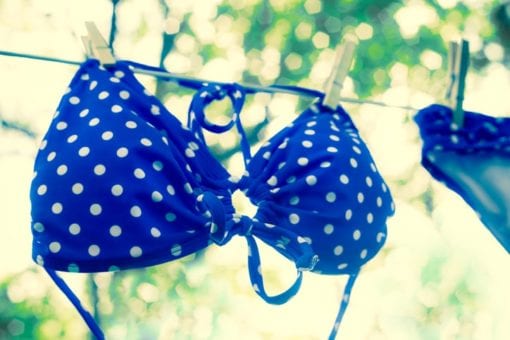Updated on 07/03/23
Summer is officially here and as with most people, when temperature rises, outfits of clothing change, along with talks about vacation and activities one will partake in. This time of year is sometimes referred to as “bikini season.” Innocent in its term but not in its practice.
What Is Bikini Season?
Interestingly, when I went to look up the origins of the season, there was not much to be found of those who created it or why the term “bikini season” has lasted as long as it has. What I did find, however, was the origin of what is known as the “bikini body.” Coined by a 1961 ad in Slenderella International, it explicitly states what a bikini body consists of: a young handspan waist, trimmed hips, graceful legs and a firm bust.
When doing a little more digging, I found that bikini season is very much described along the same lines as a bikini body. In essence, bikini season has been created for bikini bodies. So where does that leave those who are not young with hand span waists and graceful legs? What do those people do for the summer in hot weather? Should they cover up? Perhaps there is another season running simultaneously that accepts the body that didn’t qualify? Sounds a bit silly, doesn’t it?
For many, bikini season is seen as another way to control women’s bodies by determining what they can and cannot do with them. For some, bikini season is another tool devised for the enjoyment of cisgender men who want to bask in the ability to see women walk around with minimal clothing on. But in addition to these things, bikini season also puts an abnormal amount of pressure on individuals, particularly younger girls, to conform and contort their bodies to fit society’s definition of beauty over their own.
No Such Thing as a Perfect Body
I’m sure by now we have all seen and heard our fair share of weight loss and dieting ads. Starting in early January, almost like clockwork, advertisements tell us to get summer ready and have the body we always wanted. The thing with this type of messaging is that it simply is not true—the perfect body most people are looking at in these ads have been altered, airbrushed and embellished to sell a product. The weight loss market is a 70 billion dollar industry with a dismal failure rate. The pictures we are sold do not pan out in the long run. Moreover, previous studies show that roughly 50% of teenagers feel dissatisfied with their bodies after looking through magazines, and many studies support the same type of findings after conducting research on social media platforms like Instagram. It’s important to know facts and understand that the perfect body you actually desire is the one you currently have.
What Can You Do If You Still Feel Uneasy During So-Called Bikini Season?
With the rise of body positive representation, there is an increase in encouragement and availability of swimsuits for people of varying sizes. Here are some steps you can take to divest from what is typically known as “bikini season” and find comfort:
- Change what you see on social media platforms – If you follow people or brands that are heavily into diet culture or body shaming, consider swapping them out for more body positive influences. Users like Bodyposipanda is a good place to start! Other pages like Fat Women of Color also provide inspiration for people who do not fit society’s definition of beauty. In shopping, brands like Swimsuits for All carry fashionable looks in sizes 4-40.
- Dress for comfort, not for show – Your attire should make you feel good. If you feel uncomfortable, try something else.
- Normalize the appearance of bodies without filters – So much of what we see today has been filtered. Spend time seeing the beauty in yourself and normalizing that other bodies look just like yours.
- Change your language – What would happen if we stopped referring to marks on our bodies as blemishes? What would be the outcome if we decided to change the language we use about bodies with negative connotations into something positive? Changing the words you use about yourself can have a lasting impact that will benefit you long after summer is over.
So, Who Can Wear a Bikini During Bikini Season?
Everyone! Bikini season does not have to have a start or end date. You do not even have to refer to summer with that term. All you have to do is show up. Find a swimsuit that works best for you (or not) and be yourself. No hand span waist required!
Still Need Help?
If you find yourself still struggling with the ideas of body image and acceptability, help is available. You can contact Center of Discovery today and get the support you need.
Joy Cox, PhD, is a body justice advocate using her skill set in research and leadership to foster social change through the promotion of fat acceptance, diversity and inclusion. She currently sits as the Chair for the Association of Size Diversity and Health (ASDAH) and hosts the podcast, Fresh Out the Cocoon, which focuses on the lived experiences of Black fat women.
